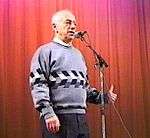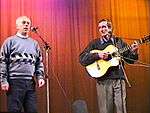Alexander Gorodnitsky
Alexander Moiseevich Gorodnitsky (Russian: Алекса́ндр Моисе́евич Городни́цкий, IPA: [ɐlʲɪˈksandr məɪˈsʲejɪvʲɪtɕ ɡərɐˈdʲnʲitskʲɪj] (![]()


Biography
Gorodnitsky was born in Leningrad to a Russian Jewish family and graduated with a degree in geophysics from the Leningrad Mining Institute in 1957. He also received a Ph.D. in geological and mineralogical sciences in 1982. He became a professor in 1991 and has published over 260 scientific papers.
Since 1962, he has participated in Arctic geological expeditions and sailed on board various scientific research vessels. Gorodnitsky's first songs appeared during his expedition in 1953. For a long time his songs were distributed via samizdat tape recordings, and often performed by other singers. Like Alexander Galich, and unlike other bards, Gorodnitsky composed and sang his songs a cappella for several decades; later, he started playing the guitar. Most of his songs are of the Tourist Song subgenre and are based on his personal experiences. In concert, he usually performs with a professional guitarist accompanying him.
Gorodnitsky currently resides in Moscow and regularly performs at concerts and various bard festivals.
External links
| Wikimedia Commons has media related to Alexander Gorodnitsky. |
- (in Russian) gorodnit.spb.ru—official site
- (in English) Personalities of Saint-Petersburg—biography and photographs
- (in English) Alexander Gorodnitsky’s bio
- (in Russian) А.М. Городницкий поёт "Снег" и "Над Канадой". Видео. "Климат, лёд, вода, ландшафты"